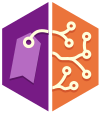MusicBrainz Picard
| MusicBrainz Picard
|
|
|---|---|

|
|
 MusicBrainz Picard 2.1 on Linux |
|
| Basic data
|
|
| developer | MusicBrainz |
| Current version |
2.3.2 ( May 6, 2020 ) |
| operating system | Linux , Windows , macOS |
| programming language | python |
| category | Tag editor |
| License | GPL |
| German speaking | Yes |
| picard.musicbrainz.org | |
MusicBrainz Picard is free , cross-platform application software for the MusicBrainz database, written in Python . With it, the appropriate metadata for local music files can be loaded from the Internet database or - if no suitable data records are available - these can also be filled in and uploaded yourself. The focus of this current reference program for the MusicBrainz service is the album-oriented working method and the cross-platform availability .
Existing metadata is used to find the appropriate data records or, from version 0.7, so-called acoustic fingerprints are created and compared.
After assigning a piece of music or album to a data record, Picard not only saves the common metadata (such as title, artist, album) in the associated music file, but also the so-called MusicBrainz IDs , the title, artist and album identify. In addition, Picard offers the function of moving the enriched music files to a user-defined central directory, using a standardized, but customizable, directory and file name format.
Picard was completely rewritten for version 0.9. He has a new release-oriented interface and is now using Qt , which made it easier to develop across platforms.
The metadata formats are supported
- ID3 tags ( MP3 )
- Vorbis comments ( Ogg Vorbis , Speex , FLAC )
- APE tags ( Musepack , WavPack , The True Audio )
- MP4
- Windows Media Audio
Up to version 1.2, the Portable Unique Identifiers (PUIDs) were used as acoustic fingerprints . A piece of music in one of the supported formats must be analyzed once with the MusicDNS software in order to generate a PUID and upload it to the PUID server. Afterwards, all formats of this piece worldwide can then be assigned to this PUID and thus also to a database entry in MusicBrainz.
Instead of PUIDs, only the AcoustID system, which has been supported since version 1.0 and was developed by Picard developer Lukáš Lalinský, is now used exclusively .
Individual evidence
- ↑ Release 2.3.2 . May 6, 2020 (accessed May 7, 2020).
- ↑ The picard Open Source Project on Open Hub: Languages Page . In: Open Hub . (accessed on September 3, 2018).
- ↑ http://blog.musicbrainz.org/?p=1856
- ↑ http://blog.musicbrainz.org/?p=1457
Web links
- MusicBrainz Picard in the Wiki of MusicBrainz